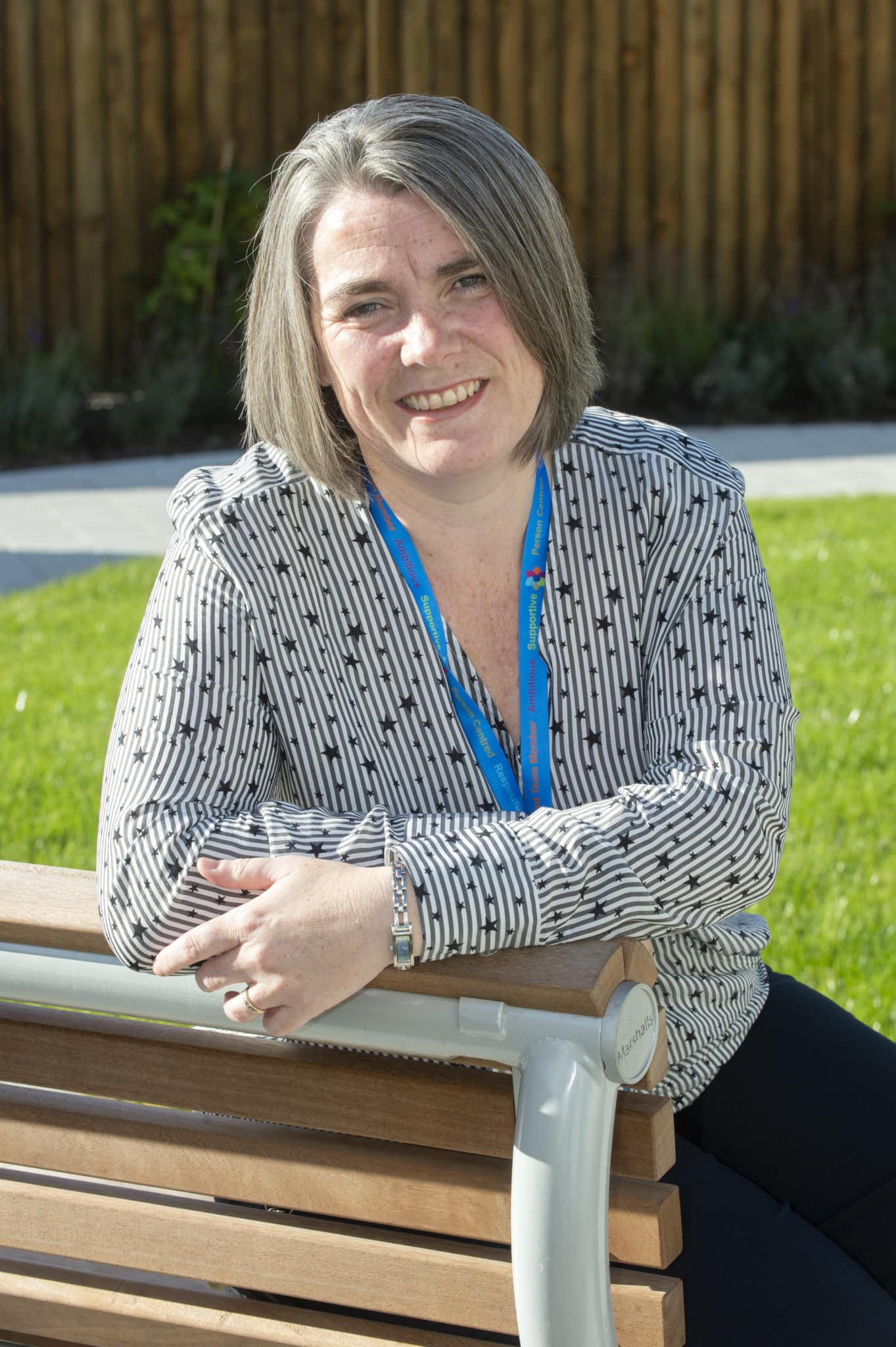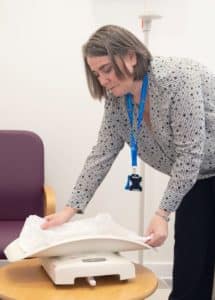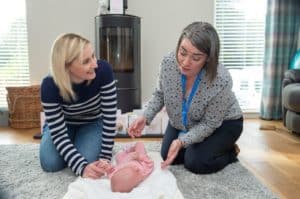Debbie Wishart
Health Visitor
NHS Forth Valley

Based at the recently built Doune Health Centre, my post with NHS Forth Valley covers rural Stirlingshire. It’s an affluent, often remote community. There are a few villages but it’s mainly farms, with roughly 200 families. Visits often involve tricky journeys along remote, winding roads. I sometimes travel to these visits thinking the road has ended – but there will be a farm further along, hidden from view. This can be a tight-knit community, and I have to be mindful that often families are related, which requires particular thoughtfulness and sensitivity around professional boundaries. Within my caseload there are families with additional needs and children with long-term and life limiting conditions. I am able to draw on the breadth of my nursing and health visiting expertise to provide the more intensive support that these families need. I absolutely love this job, I wouldn’t do anything else.
 As a health visitor I get to know the children and families I meet over a five year-span. There is strong evidence that the first 1,000 days of a child’s life is the most important. It is a unique and privileged position to work with families for this extended time – you can see them flourish, you can be there for them in times of crisis and help them through that. Becoming a parent is such a significant change in an adult’s life and it’s about me being able to support them through that challenge to enable them to meet the needs of their child and to offer the information they require to make an informed choice about what is best for their child .
As a health visitor I get to know the children and families I meet over a five year-span. There is strong evidence that the first 1,000 days of a child’s life is the most important. It is a unique and privileged position to work with families for this extended time – you can see them flourish, you can be there for them in times of crisis and help them through that. Becoming a parent is such a significant change in an adult’s life and it’s about me being able to support them through that challenge to enable them to meet the needs of their child and to offer the information they require to make an informed choice about what is best for their child .
 It is essential as a health visitor to establish and maintain a therapeutic relationship with a family – but it is also about being open and honest. You always want to work with a family and at the heart of that is communication skills and emotional intelligence. Often I work with families with additional needs, or complex family dynamics. I need to have courageous conversations to make sure children are safe and have all their needs met by the parents. I use motivational interviewing which enables people to come up with their own solutions to their own problems. Through these conversations I am able to help a family identify their strengths as well as the issues. There is a risk that families only hear negative messages and the family just switches off. My role is to find something we can build on and use, no matter how small. It’s all about respecting families. Even if a family does disagree with you, there’s normally a reason behind that – it’s about giving them the time and the space and listening deeply to understand where they are coming from because their priorities could be completely different to mine. Together we find that common ground. My professional knowledge includes the ages and stages of development as often parents are concerned about where their children are so it’s about alleviating their stresses and anxieties where possible. Sometimes the greatest impact I can have is trying to model nurturing behaviour to build attunement and attachment – getting down on a floor and interacting with a baby. The parent sees that and thinks ‘oh maybe I could do that’ .
It is essential as a health visitor to establish and maintain a therapeutic relationship with a family – but it is also about being open and honest. You always want to work with a family and at the heart of that is communication skills and emotional intelligence. Often I work with families with additional needs, or complex family dynamics. I need to have courageous conversations to make sure children are safe and have all their needs met by the parents. I use motivational interviewing which enables people to come up with their own solutions to their own problems. Through these conversations I am able to help a family identify their strengths as well as the issues. There is a risk that families only hear negative messages and the family just switches off. My role is to find something we can build on and use, no matter how small. It’s all about respecting families. Even if a family does disagree with you, there’s normally a reason behind that – it’s about giving them the time and the space and listening deeply to understand where they are coming from because their priorities could be completely different to mine. Together we find that common ground. My professional knowledge includes the ages and stages of development as often parents are concerned about where their children are so it’s about alleviating their stresses and anxieties where possible. Sometimes the greatest impact I can have is trying to model nurturing behaviour to build attunement and attachment – getting down on a floor and interacting with a baby. The parent sees that and thinks ‘oh maybe I could do that’ .
 As part of the Queen’s Nurse award, the issue I chose to develop was to look at engaging fathers and partners in the health visiting service. Dads can drop off the radar a little bit – I really want to try to promote and support their role. For me, being on this journey has been insightful and revealing. It has allowed me to actually fall back in love with being a nurse and given me skills to realise that although there are challenges, it is about overcoming these and thriving in that adversity.
As part of the Queen’s Nurse award, the issue I chose to develop was to look at engaging fathers and partners in the health visiting service. Dads can drop off the radar a little bit – I really want to try to promote and support their role. For me, being on this journey has been insightful and revealing. It has allowed me to actually fall back in love with being a nurse and given me skills to realise that although there are challenges, it is about overcoming these and thriving in that adversity.